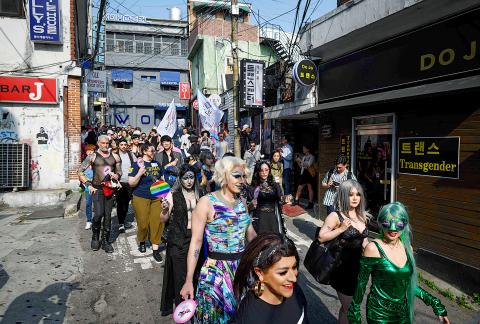South Korea held its first ever drag parade this weekend, a small, but significant step for rights campaigners in a country that remains deeply conservative when it comes to gender and sexuality.
Dozens of drag queens and kings marched through Seoul’s Itaewon neighborhood on Saturday, which is best known for its nightlife and a nascent but vibrant gay scene.
Carrying rainbow flags, they cheered and strutted their best outfits, receiving shouts of support and the odd baffled look from those they passed.

Photo: AFP
While homosexuality is not illegal in South Korea, same-sex marriage is not recognized and people cannot legally change their birth gender. The country is home to a large evangelical Christian community and LGBT people feel pervasive pressure to stay closeted.
“When it comes to South Korea, human rights guarantees for sexual minorities are insufficient,” said Yang Heezy, a drag queen and the organizer of the Seoul Drag Parade.
“Today’s drag parade and more queer culture festivals should take place to bring attention to sexual minorities and help those who are not from those minorities learn more,” he added, sporting a flame-red wig and floral dress.
The parade drew South Koreans, as well as foreigners.
One participant, who gave her drag queen name, Lola Bank, said that there was a feeling of exhilaration among marchers.
“The fact that we are able to be in public in drag is a huge milestone to queer acceptance in Korea,” Lola said, dragging on a cigarette. “I’ve always struggled with my masculinity and my femininity. And when I get in drag, I’m saying kind of like a ‘fuck you’ to society’s expectations of how I should behave as a male.”
Gay pride parades have been a fixture in South Korea for years, but have often been protested by religious groups, who have held rival anti-homosexuality rallies while trying to physically block marchers.
Even left-leaning South Korean President Moon Jae-in — a former human rights lawyer — said that he “opposed homosexuality” during a campaign debate last year.
Gay rights campaigners claim that some progress has been made over the past few years, with surveys showing increasing tolerance — particularly among young people — and growing participation at gay pride events.
Saturday’s small parade saw no counter-demonstration. Lee Hyang-soon, an elderly street vendor, smiled and waved to participants as they passed.
“It’s really cool. Seeing all the foreigners join in, it feels like Korea is becoming world famous,” she said. “I’m happy. It’s fabulous.”

A fire caused by a burst gas pipe yesterday spread to several homes and sent a fireball soaring into the sky outside Malaysia’s largest city, injuring more than 100 people. The towering inferno near a gas station in Putra Heights outside Kuala Lumpur was visible for kilometers and lasted for several hours. It happened during a public holiday as Muslims, who are the majority in Malaysia, celebrate the second day of Eid al-Fitr. National oil company Petronas said the fire started at one of its gas pipelines at 8:10am and the affected pipeline was later isolated. Disaster management officials said shutting the

US Vice President J.D. Vance on Friday accused Denmark of not having done enough to protect Greenland, when he visited the strategically placed and resource-rich Danish territory coveted by US President Donald Trump. Vance made his comment during a trip to the Pituffik Space Base in northwestern Greenland, a visit viewed by Copenhagen and Nuuk as a provocation. “Our message to Denmark is very simple: You have not done a good job by the people of Greenland,” Vance told a news conference. “You have under-invested in the people of Greenland, and you have under-invested in the security architecture of this

UNREST: The authorities in Turkey arrested 13 Turkish journalists in five days, deported a BBC correspondent and on Thursday arrested a reporter from Sweden Waving flags and chanting slogans, many hundreds of thousands of anti-government demonstrators on Saturday rallied in Istanbul, Turkey, in defence of democracy after the arrest of Istanbul Mayor Ekrem Imamoglu which sparked Turkey’s worst street unrest in more than a decade. Under a cloudless blue sky, vast crowds gathered in Maltepe on the Asian side of Turkey’s biggest city on the eve of the Eid al-Fitr celebration which started yesterday, marking the end of Ramadan. Ozgur Ozel, chairman of the main opposition Republican People’s Party (CHP), which organized the rally, said there were 2.2 million people in the crowd, but

JOINT EFFORTS: The three countries have been strengthening an alliance and pressing efforts to bolster deterrence against Beijing’s assertiveness in the South China Sea The US, Japan and the Philippines on Friday staged joint naval drills to boost crisis readiness off a disputed South China Sea shoal as a Chinese military ship kept watch from a distance. The Chinese frigate attempted to get closer to the waters, where the warships and aircraft from the three allied countries were undertaking maneuvers off the Scarborough Shoal — also known as Huangyan Island (黃岩島) and claimed by Taiwan and China — in an unsettling moment but it was warned by a Philippine frigate by radio and kept away. “There was a time when they attempted to maneuver